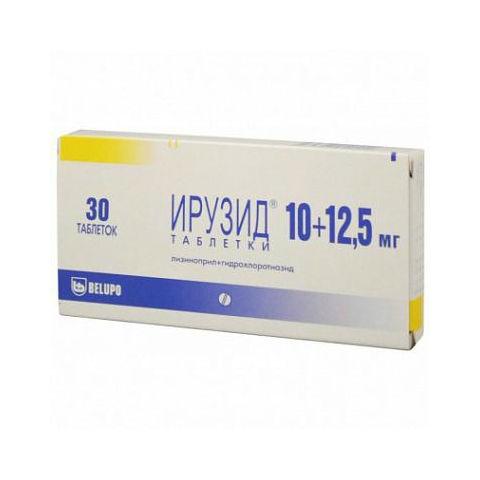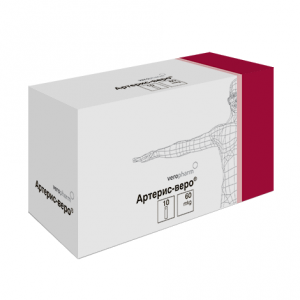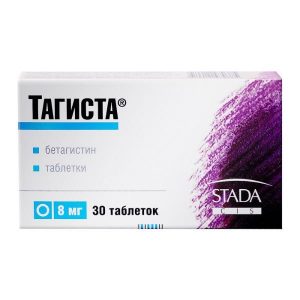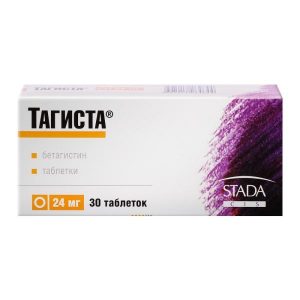Description
release form
release form tablets
Indications
Arterial hypertension (in patients who are shown combination therapy).
Contraindications
hypersensitivity to the drug, other ACE inhibitors and sulfanilamide derivatives
anuria
severe renal failure (Cl creatinine < 30 ml / min) angioedema (including history with the use of ACE inhibitors) hemodialysis using high-flow membranes hypercalcemia hyponatremia porphyria coma srpkl diabetes efficacy and safety not established). Precautions: aortic stenosis / hypertrophic cardiomyopathy bilateral renal artery stenosis of a single kidney artery with progressive azotemia condition after kidney transplantation renal failure (Cl creatinine> 30 ml / min) primary hyperaldosteronism hypotension hypoplasia bone marrow hypotension hypoplasia hypotension patients those on a low-salt or salt-free diet) hypovolemic conditions (including diarrhea, vomiting) diseases of the connective tissue (systemic lupus erythematosus, scleroderma) diabetes mellitus gout, hyperuricemia, oppression of bone marrow hematopoiesis, coronary heart disease, cerebrovascular disease (including cerebrovascular insufficiency ) severe chronic heart failure, liver failure, old age.
Special instructions
Symptomatic hypotension
Most often, a marked decrease in blood pressure occurs with a decrease in fluid volume caused by diuretic therapy, a decrease in the amount of salt in food, dialysis, diarrhea or vomiting (see ² ÑInteraction ² Ñ and ² ÑSide effects ² Ñ). In patients with chronic heart failure with simultaneous renal failure or without it, a marked decrease in blood pressure is possible. Hypotension is more often detected in patients with severe heart failure as a result of the use of large doses of diuretics, hyponatremia, or impaired renal function. In such patients, treatment should begin under the strict supervision of a physician. Similar rules should be followed when prescribing to patients with coronary artery disease or cerebrovascular insufficiency, in which a sharp decrease in blood pressure can lead to myocardial infarction or stroke.
Transient hypotensive reaction is not a contraindication for taking the next dose of the drug.
Before treatment, if possible, normalize the concentration of sodium and / or replenish the lost volume of fluid, carefully monitor the effect of the initial dose of the drug on the patient.
Impaired renal function
In patients with chronic heart failure, a marked decrease in blood pressure after starting treatment with ACE inhibitors can lead to further deterioration of renal function. Cases of acute renal failure are noted. Patients with bilateral renal artery stenosis or a single kidney artery stenosis treated with ACE inhibitors showed an increase in serum urea and creatinine, usually reversible after discontinuation of treatment. More often, these changes were found in patients with renal failure.
Hypersensitivity / Angioneurotic edema
Angioedema of the face, limbs, lips, tongue, epiglottis and / or larynx may occur at any time during treatment, rarely seen in patients treated with ACE inhibitors, including lisinopril. In this case, treatment with lisinopril should be stopped as soon as possible and the patient should be monitored until the symptoms regress completely. In cases where edema occurs only on the face and lips, it most often goes away without treatment, however, it is possible to prescribe antihistamines.
Angioneurotic edema with laryngeal edema can be fatal. When the tongue, epiglottis or larynx is covered, airway obstruction may occur, therefore, appropriate therapy should be immediately carried out (0.3-0.5 ml of epinephrine (adrenaline) 1: 1000 s / c solution) and / or measures should be taken to ensure airway obstruction ways.
Patients who have had a history of angioedema not associated with previous treatment with ACE inhibitors may have an increased risk of developing it during treatment with an ACE inhibitor.
Cough
When using an ACE inhibitor, a dry, prolonged cough was noted, which disappears after cessation of treatment with an ACE inhibitor. With a differential diagnosis of cough, cough caused by the use of an ACE inhibitor should be considered.
Patients on hemodialysis
Anaphylactic reaction was also observed in patients undergoing hemodialysis using high-permeability dialysis membranes, which simultaneously take ACE inhibitors. In such cases, it is necessary to consider the use of a different type of membrane for dialysis or another antihypertensive drug.
Surgery / General anesthesia
When using drugs that lower blood pressure in patients with extensive surgery or during general anesthesia, lisinopril can block the formation of angiotensin II. Marked decrease in blood pressure, which is considered a consequence of this mechanism, can be eliminated by an increase in bcc.
Before surgery (including dental), it is necessary to warn the surgeon / anesthetist about the use of ACE inhibitors.
Potassium in serum
In some cases, hyperkalemia was noted.
Risk factors for developing hyperkalemia include kidney failure, diabetes mellitus, potassium supplements, or drugs that increase blood potassium levels (such as heparin), especially in patients with impaired renal function.
In patients who are at risk of symptomatic hypotension (those on a low-salt or salt-free diet) with or without hyponatremia, as well as in patients who received high doses of diuretics, the loss of fluid and salts should be compensated before starting treatment.
Metabolic and endocrine effects of
Thiazide diuretics can affect glucose tolerance, therefore, it is necessary to adjust the dose of antidiabetic drugs.
Thiazide diuretics can reduce urinary calcium excretion and cause hypercalcemia. Severe hypercalcemia may be a symptom of latent hyperparathyroidism. It is recommended that treatment with thiazide diuretics be discontinued before a test to evaluate parathyroid function.
During the treatment with the drug, regular monitoring of potassium, glucose, urea and lipids in the blood plasma is necessary.
During the treatment period, it is not recommended to drink alcoholic beverages, as alcohol enhances the hypotensive effect of the drug.
Caution should be exercised when performing physical exercises, hot weather (risk of dehydration and an excessive decrease in blood pressure due to a decrease in bcc).
Influence on the ability to drive a car or perform work that requires an increased speed of physical and mental reactions. During the treatment period, one should refrain from driving vehicles and engaging in potentially dangerous activities that require increased concentration of attention and speed of psychomotor reactions, as dizziness is possible, especially at the beginning of the course of treatment.
Composition
1 tablet contains:
Active ingredients:
lisinopril,
hydrochlorothiazide
Excipients:
calcium phosphate starch, starch pregelatinized corn,
magnesium stearate,
iron oxide yellow,
purified water.
Dosage and administration of
In case of essential arterial hypertension, the drug is administered orally 1 tablet once a day.
If necessary, the dose can be increased to 2 tablets 1 time per day.
Dose for renal failure
In patients with Cl creatinine from 30 to 80 ml / min, the drug can be used only after selecting a dose of the individual components of the drug. The recommended initial dose of lisinopril in uncomplicated renal failure is 5 10 mg.
Previous diuretic therapy
Symptomatic hypotension may occur after taking the initial dose of Iruzid ®. Such cases are more common in patients with loss of fluid and electrolytes due to previous treatment with diuretics. Therefore, you should stop taking diuretics 2-3 days before starting treatment with Iruzide
Side effects
From the CCC side: marked decrease in blood pressure, chest pain rarely – orthostatic hypotension, tachycardia, bradycardia, symptoms of heart failure, impaired AV conduction, myocardial infarction.
From the digestive tract: nausea, vomiting, abdominal pain, dry mouth, diarrhea, dyspepsia, anorexia, taste change, pancreatitis, hepatitis (hepatocellular and cholestatic), jaundice.
From the skin: urticaria, increased sweating, photosensitivity, skin itching, hair loss.
From the side of the nervous system: lability of mood, impaired concentration of attention, paresthesia, increased fatigue, drowsiness, convulsive twitching of the muscles of the limbs and lips rarely – asthenic syndrome, confusion.
From the respiratory system: dyspnea, bronchospasm, apnea.
From the hemopoietic system: leukopenia, thrombocytopenia, neutropenia, agranulocytosis, anemia (decreased hemoglobin, hematocrit, erythrocytopenia).
Allergic reactions: angioedema of the face, limbs, lips, tongue, epiglottis and / or larynx, skin rashes, itching, fever, vasculitis, positive reactions to antinuclear antibodies, increased ESR, eosinophilia.
From the genitourinary system: uremia, oliguria / anuria, impaired renal function, acute renal failure, decreased potency.
Laboratory indicators: hyperkalemia and / or hypokalemia, hyponatremia, hypomagnesemia, hypochloraemia, hypercalcemia, hyperuricemia, hyperglycemia, increased levels of urea and creatinine in blood plasma, hyperbilirubinemia, hypercholesterolemia, hypertemia, high blood pressure a history of kidney disease, diabetes mellitus and renovascular hypertension.
Other: dry cough, arthralgia, arthritis, myalgia, fever, impaired fetal development, exacerbation of gout.
Drug Interactions
With the simultaneous use of Iruzide with potassium-sparing diuretics (spironolactone, triamteren, amiloride), potassium preparations, salt substitutes containing potassium, the risk of hyperkalemia increases, especially in patients with impaired renal function.
With the simultaneous use of Iruzide with vasodilators, barbiturates, phenothiazines, tricyclic antidepressants, an increase in the antihypertensive effect is noted.
With the simultaneous use of Iruzide with NSAIDs, estrogens, the antihypertensive effect of lisinopril is reduced.
With the simultaneous use of Iruzide with lithium preparations, lithium excretion from the body slows down, which leads to an increase in the cardiotoxic and neurotoxic effects of lithium.
With simultaneous use with antacids and colestyramine, absorption of Iruzide in the digestive tract is reduced.
Iruzide with simultaneous use enhances the neurotoxicity of salicylates.
With the simultaneous use of Iruzide weaken the effect of oral hypoglycemic drugs, norepinephrine, epinephrine and anti-gout agents.
With the simultaneous use of Iruzide enhances the effects (including side) of cardiac glycosides, the action of peripheral muscle relaxants.
With the simultaneous use of Iruzide reduces the excretion of quinidine.
With simultaneous use, it reduces the effect of oral contraceptives.
Overdose
Symptoms: marked decrease in blood pressure.
Treatment: to induce vomiting and / or to wash stomach, to carry out symptomatic therapy aimed at correction of dehydration and disturbances of water-salt balance. Isotonic solution should be administered for hypotension. Control of urea, creatinine and electrolytes in serum should be performed as well as diuresis.
Storage Conditions
The product should be stored out of the reach of children at temperatures up to 25 ° C.
Active ingredient
Lisinopril, Hydrochlorothiazide
Pharmacy conditions
prescription
dosage form
tablets
Possible product names
IRUZID 0.01 + 0.0125 N30 TABL
Iruzid 10mg / 12.5mg Tab. X30
Iruzid Tab 10 + 12.5mg x 30
IRUZID TAB. 10MG + 12.5MG No. 30
Iruzide tablet 10mg + 12.5mg N30 Croatia
Belupo, medicines and cosmetics d.d, Croatia




